- Home
- Garth Stein
Art of Racing in the Rain, The Page 2
Art of Racing in the Rain, The Read online
Page 2
I’m sure my father was a terrier. Because terriers are problem solvers. They’ll do what you tell them, but only if it happens to be in line with what they wanted to do anyway. There was a terrier like that on the farm. An Airedale. Big and brown-black and tough. No one messed with him. He didn’t stay with us in the gated field behind the house. He stayed in the barn down the hill by the creek where the men went to fix their tractors. But sometimes he would come up the hill, and when he did, everyone steered clear. Word in the field was he was a fighting dog the alpha man kept separate because he’d kill a dog for sniffing in his direction. He’d rip the fur from a nape because of a lazy glance. And when a bitch was in heat, he’d mount her good and go about his business without a thought about who was watching or who cared. I’ve often wondered if he sired me. I have his brown-black coloring and my coat is slightly wiry, and people frequently comment that I must be part terrier. I like to think I came from a determined gene pool.
I remember the heat on the day I left the farm. Every day was hot in Spangle, and I thought the world was just a hot place because I never knew what cold was about. I had never seen rain, didn’t know much about water. Water was the stuff in the buckets that the older dogs drank, and it was the stuff the alpha man sprayed out of the hose and into the faces of dogs who might want to pick a fight. But the day Denny arrived was exceptionally hot. My littermates and I were tussling around like we always did, and a hand reached into the pile and found my scruff and suddenly I was dangling high in the air.
“This one,” a man said.
It was my first glimpse of the rest of my life. He was slender, with long and lean muscles. Not a large man, but assertive. He had keen, icy blue eyes. His choppy hair and short, scruffy beard were dark and wiry, like an Irish terrier.
“The pick of the litter,” the lady said. She was nice; I always liked it when she cuddled us in her soft lap. “The sweetest. The best.”
“We were thinkin’ a keepin’ ’im,” the alpha man said, stepping up with his big boots caked with mud from the creek where he was patching a fence. That was the line he always used. Hell, I was a pup only a dozen weeks old, and I’d already heard that line a bunch of times. He used it to get more money.
“Will you let him go?”
“Fur a price,” the alpha man said, squinting at the sky, bleached a pale blue by the sun. “Fur a price.”
3
“Very gently. Like there are eggshells on your pedals,” Denny always says, “and you don’t want to break them. That’s how you drive in the rain.”
When we watch videos together—which we’ve done ever since the very first day I met him—he explains these things to me. (To me!) Balance, anticipation, patience. These are all vital. Peripheral vision, seeing things you’ve never seen before. Kinesthetic sensation, driving by the seat of the pants. But what I’ve always liked best is when he talks about having no memory. No memory of things he’d done just a second before. Good or bad. Because memory is time folding back on itself. To remember is to disengage from the present. In order to reach any kind of success in automobile racing, a driver must never remember.
Which is why drivers compulsively record their every move, their every race, with cockpit cameras, in-car video, data mapping; a driver cannot be a witness to his own greatness. This is what Denny says. He says racing is doing. It is being a part of a moment and being aware of nothing else but that moment. Reflection must come at a later time. The great champion Julian SabellaRosa has said, “When I am racing, my mind and my body are working so quickly and so well together, I must be sure not to think, or else I will definitely make a mistake.”
4
Denny moved me far from the farm in Spangle, to a Seattle neighborhood called Leschi where he lived in a little apartment he rented on Lake Washington. I didn’t enjoy apartment living much, as I was used to wide-open spaces and I was very much a puppy; still, we had a balcony that overlooked the lake, which gave me pleasure since I am part water dog, on my mother’s side.
I grew quickly, and during that first year, Denny and I forged a deep fondness for each other as well as a feeling of trust. Which is why I was surprised when he fell in love with Eve so quickly.
He brought her home and she was sweet smelling, like him. Full of fermented drinks that made them both act funny, they were hanging on each other like they had too many clothes between them, and they were pulling at each other, tugging, biting lips and jabbing fingers and yanking at hair, all elbows and toes and saliva. They fell onto the bed and he mounted her and she said, “The field is fertile—beware!” And he said, “I embrace the fertility.” And he plowed the field until it grasped the sheets in its fists, arched its back, and cried out with joy.
When he got up to splash in the bathroom, she patted my head, which hovered low to the floor, me still being immature at just over a year old, and a little bit intimidated by all the screaming. She said, “You don’t mind if I love him, too, do you? I won’t come between you.”
I respected her for asking, but I knew that she would come between us, and I found her preemptive denial to be disingenuous.
I tried not to act off-putting because I knew how infatuated Denny was with her. But I admit I was less than embracing of her presence. And because of that, she was less than embracing of me. We were both satellites orbiting Denny’s sun, struggling for gravitational supremacy. Of course, she had the advantage of her tongue and her thumbs, and when I watched her kiss and fondle him sometimes she would glance at me and wink as if to gloat: Look at my thumbs! See what they can do!
5
Monkeys have thumbs.
Practically the dumbest species on the planet, next to the duck-billed platypus, who make their dens underwater even though they breathe the air. The platypus is horribly stupid, but is only slightly dumber than a monkey. Yet monkeys have thumbs. Those monkey-thumbs were meant for dogs. Give me my thumbs, you fucking monkeys! (I love the Al Pacino remake of Scarface, very much, though it doesn’t compare to the Godfather movies, which are excellent.)
I watch too much TV. When Denny goes away in the mornings, he turns it on for me, and it’s become a habit. He warned me not to watch all day, but I do. Fortunately, he knows I love cars, so he lets me watch a lot of Speed Channel. The classic races are the best, and I especially like Formula One. I like NASCAR, too, but I prefer it when they race on the road circuits. While racing is my favorite, Denny told me it was good for me to have variety in my life, so he often puts on other channels, which I enjoy very much as well.
Sometimes if I’m watching the History Channel or the Discovery Channel or PBS or even one of the kids’ channels—when Zoë was little I’d end up spending half the day trying to pry goofy jingles out of my brain—I learn about other cultures and other ways of life, and then I start thinking about my own place in the world and what makes sense and what doesn’t.
They talk a lot about Darwin; pretty much every educational channel has some kind of show about evolution at some point, and it’s usually really well thought out and researched. However, I don’t understand why people insist on pitting the concepts of evolution and creation against each other. Why can’t they see that spiritualism and science are one? That bodies evolve and souls evolve and the universe is a fluid place that marries them both in a wonderful package called a human being. What’s wrong with that idea?
The scientific theorists go on and on about how monkeys are the closest evolutionary relative of people. But that’s speculation. Based on what? Based on the fact that certain ancient craniums have been found to be similar to modern man’s? What does that prove? Based on the fact that some primates walk on two feet? Being bipedal isn’t even an advantage. Look at the human foot, full of bent toes and calcium deposits and pus draining from ingrown claws that aren’t even hard enough to scratch at the earth. (And yet, how I yearn for the moment my soul inhabits one of these poorly designed bipedal bodies and I, too, assume the health concerns of a man!) So what if man’s body e
volved from the monkeys? Whether he came from monkeys or fish is unimportant. The important idea is that when the body became “human” enough, the first human soul slipped into it.
I’ll give you a theory: Man’s closest relative is not the chimpanzee, as the TV people believe, but is, in fact, the dog.
Witness my logic:
Case-in-Point #1: The Dew Claw
It is my opinion that the so-called dew claw, which is often snipped off a dog’s foreleg at an early age, is actually evidence of a preemergent thumb. Further, I believe that men have systematically bred the thumb out of certain lines of dog through an elaborate process called “selective breeding,” simply in order to prevent dogs from evolving into dexterous, and therefore “dangerous,” mammals.
I also believe that man’s continued domestication (if you care to use that silly euphemism) of dogs is motivated by fear: fear that dogs, left to evolve on their own, would, in fact, develop thumbs and smaller tongues, and therefore would be superior to men, who are slow and cumbersome, standing erect as they do. This is why dogs must live under the constant supervision of people, and are immediately put to death when found living on their own.
From what Denny has told me about the government and its inner workings, it is my belief that this despicable plan was hatched in a back room of none other than the White House, probably by an evil adviser to a president of questionable moral and intellectual fortitude, and probably with the correct assessment—unfortunately, made from a position of paranoia rather than of spiritual insight—that all dogs are progressively inclined regarding social issues.
Case-in-Point #2: The Werewolf
The full moon rises. The fog clings to the lowest branches of the spruce trees. The man steps out of the darkest corner of the forest and finds himself transformed into…
A monkey?
I think not.
6
Her name was Eve, and at first I resented how she changed our lives. I resented the attention Denny paid to her small hands, her plump, round buttocks, her modest hips. The way he gazed into her soft green eyes, which peered out from under stylish strands of straight blond hair. Did I envy her engaging smile that eclipsed anything about her that might have been considered less than special? Perhaps I did. For she was a person, unlike me. She was well groomed. Unlike me. She was everything I wasn’t. I went for extended periods without a haircut or a bath, for instance; she bathed every day and had a special person do nothing else but color her hair to Denny’s liking. My nails grew too long and scratched the wood floor; she frequently attended to her nails with sticks and clippers and polishes to make sure they were the proper shape and size.
Her attention to every detail of her appearance was reflected in her personality as well: she was an incredible organizer, fastidious in nature, constantly making lists and jotting down notes of things to be done or gotten or assembled, frequently creating what she called “Honey-Do” lists for Denny and me, so that our weekends were filled with trips to the Home Depot or waiting in line at the Disposal and Recycling Transfer Station in Georgetown. I didn’t like painting rooms and fixing doorknobs and washing screens. But Denny liked it, apparently, because the more she gave him to do, the more quickly he completed his tasks so he could collect his reward, which usually included a lot of nuzzling and stroking.
Soon after she moved into our apartment, they were married in a small wedding ceremony, which I attended along with a group of their closest friends and Eve’s immediate family. Denny didn’t have any brothers or sisters to invite, and he explained his parents’ absence simply by saying that they didn’t travel well.
Eve’s parents made it clear to all involved that the house in which the wedding took place, a charming little beach cottage on Whidbey Island, was owned by close friends of theirs who were not in attendance. I was allowed to participate only under strict rules: I was not to roam freely on the beach or swim in the bay, as I might track sand onto the expensive mahogany floors. And I was forced to urinate and defecate in a very specific location next to the recycling containers.
Upon our return from Whidbey, I noticed that Eve moved through our apartment with a greater sense of authorship, and was much bolder in her actions to move or replace things: towels, linens, and even furniture. She had entered our lives and changed everything around. And yet, while I was unhappy with her intrusion, there was something about her that prevented me from mustering any real anger. I believe that thing was her swollen belly.
There was something about the effort it took for her to lie down on her side to rest, having removed her shirt and undergarments, the way her breasts fell just so across her chest as she lay on the bed. It reminded me of my own mother at mealtime when she sighed and shrugged herself to the ground, lifting her leg to expose her nipples to us. These are the devices I use to feed you. Now eat! And while I greatly resented the attention Eve lavished on her unborn baby, in retrospect, I realize I had never given her a reason to lavish that same attention on me. Perhaps that is my regret: I loved how she was when she was pregnant, and yet I knew I could never be the source of her affection in that way because I could never be her child.
She devoted herself to the baby before it was even born. She touched it regularly through her tightly stretched skin. She sang to it and danced with it to music she played on the stereo. She learned to make it move around by drinking orange juice, which she did frequently, explaining to me that the health magazines demanded she drink the juice for the folic acid, but she and I both knew she was doing it for the kick. She once asked if I wanted to know what it felt like, and I did, so she held my face against her belly after she had drunk the acid, and I felt it move. An elbow, I think, pushing out perversely, like something reaching out from the grave. It was hard for me to imagine exactly what was going on behind the curtain, inside Eve’s magic sack where the little rabbit was being assembled. But I knew that what was inside of her was separate from her, and had a will of its own and moved when it wanted to—or when prodded by the acid—and was beyond her control.
I admire the female sex. The life makers. It must be amazing to have a body that can carry an entire creature inside. (I mean, other than a tapeworm, which I’ve had. That doesn’t count as another life, really. That’s a parasite and should never have been there in the first place.) The life that Eve had inside her was something she had made. She and Denny had made it together. I wished, at the time, that the baby would look like me.
I remember the day the baby arrived. I had just reached adulthood—two years by calendar count. Denny was in Daytona, Florida, for the drive of his career. He had spent the entire year soliciting sponsors, begging, pleading, hustling, until he got lucky and found the right person in the right hotel lobby to say, “You’ve got balls, son. Call me tomorrow.” Thus, he found his long-sought sponsor dollars and was able to buy a seat in a Porsche 993 Cup Car for the Rolex 24 Hours of Daytona.
Endurance racing is not for the meek. Four drivers each spending six hours behind the wheel of a loud, powerful, challenging, and expensive race car is an exercise in coordination and determination. The 24 Hours of Daytona, which is broadcast on television, is as unpredictable as it is exciting. That Denny was presented with a chance to drive it in the same year that his daughter would be born was one of those coincidences that turn on interpretation: Eve was dismayed by the unfortunate timing of the events; Denny celebrated the bounty of opportunity and the feeling that he had everything he could possibly ask for.
Still, the timing was off. On the day of the race, even though it was more than a week before schedule, Eve felt the contractions and called the midwives, who invaded our home and quickly took charge. Later that evening, as Denny was, no doubt, driving the circuit in Daytona and winning the race, Eve stood bent over the bed with two round ladies who helped her by holding her arms, and with a monstrous bellow that seemed to last an hour, squirted out a little bloody blob of human tissue that wriggled spastically and then cried out. The ladies helped Eve
into her bed and rested the tiny purple thing on her torso until the baby’s searching mouth found Eve’s nipple and began to suck.
“Could I have a minute alone—?” Eve started.
“Of course,” one of the ladies said, moving to the door.
“Come with us, puppy,” the other lady said to me on her way out.
“No—” Eve stopped them. “He can stay.”
I could stay? Despite myself, I felt proud to be included in Eve’s inner circle. The two ladies bustled off to take care of whatever they needed to take care of, and I watched in fascination as Eve suckled her new babe. After a few minutes, my attention drifted from the baby’s first meal to Eve’s face, and I saw that she was crying and I wondered why.
She let her free hand dangle to the bedside, her fingers near my muzzle. I hesitated. I didn’t want to presume she was beckoning me. But then her fingers wiggled and her eyes caught mine, and I knew she was calling me. I bumped her hand with my nose. She lifted her fingers to the crown of my head and scratched, still crying, her baby still nursing.

 A Sudden Light
A Sudden Light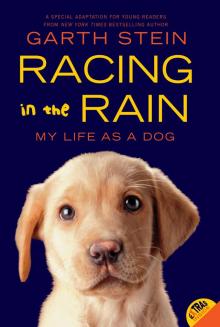 The Art of Racing in the Rain
The Art of Racing in the Rain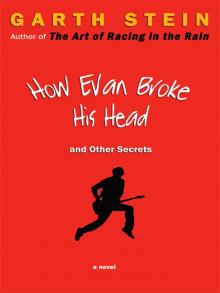 How Evan Broke His Head and Other Secrets
How Evan Broke His Head and Other Secrets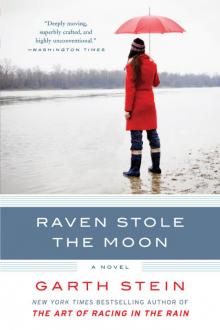 Raven Stole the Moon
Raven Stole the Moon A Sudden Light: A Novel
A Sudden Light: A Novel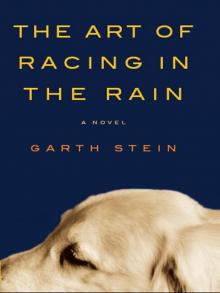 Art of Racing in the Rain, The
Art of Racing in the Rain, The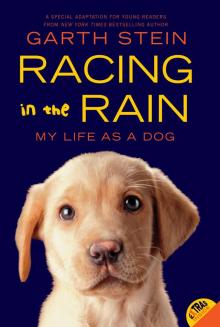 Racing in the Rain
Racing in the Rain